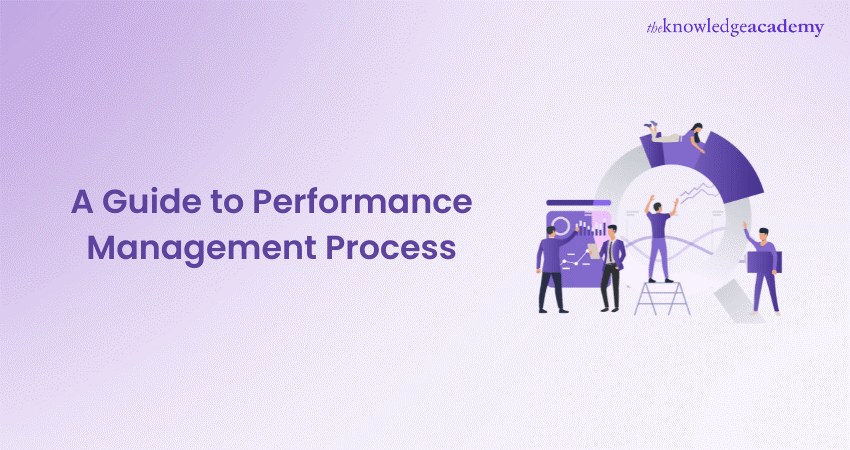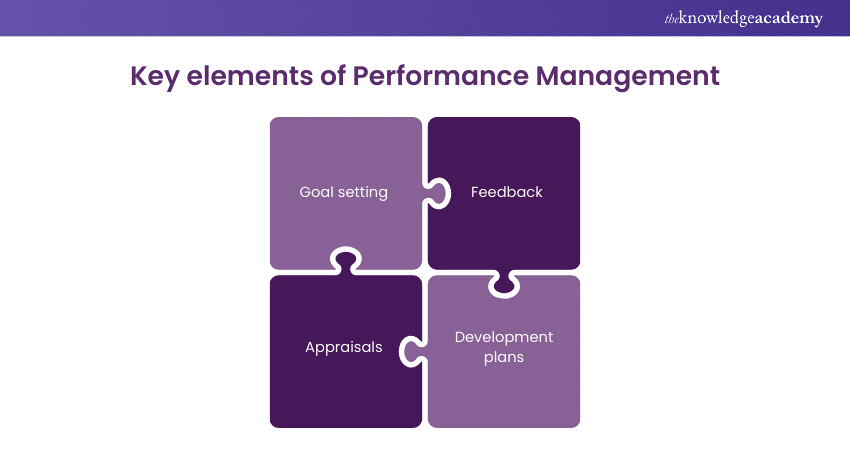We may not have the course you’re looking for. If you enquire or give us a call on +44 1344 203 999 and speak to our training experts, we may still be able to help with your training requirements.
Training Outcomes Within Your Budget!
We ensure quality, budget-alignment, and timely delivery by our expert instructors.

To achieve organisational success, it is crucial to keep an eye on employees’ performance. In the complex environment of organisational dynamics, the Performance Management Process emerges as a pivotal partner, guiding each step towards operational harmony. This blog aims to provide a deep dive into the intricacies of Performance Management, offering a wealth of strategies, best practices, and practical tips to help organisations optimise their Performance Management Process and unlock the full potential of their workforce.
Table of Contents
1) What is the Performance Management Process?
2) Performance Management Process steps
3) Key elements of Performance Management
4) The role of leadership in effective Performance Management
5) Conclusion
What is the Performance Management Process?
The Performance Management Process is a structured and thorough approach for improving and optimising employee performance and productivity. It is a sequence of interrelated activities which cover goal setting, monitoring, feedback, assessing and rewards amongst others. Coordination of each activity is geared towards ensuring that the efficiency of employees is in line with the organisational goals and objectives.
Performance Management Process is a key organisational strategy that optimises employee performance to meet business goals. It systematically integrates planning, monitoring, developing, rating, and rewarding employees. This approach aligns individual achievements with company objectives and promotes a culture of continuous improvement and recognition. At its core, this process fosters a culture of accountability, transparency, and continuous improvement within the organisation.
Performance Management Process steps
Here's a closer look at each step in the Performance Management Process, which is essential for driving success and fostering employee growth within an organisation:
1) Planning
The planning phase defines specific and measurable targets for employees used as a foundation for Performance Management strategy. These goals must be based on the strategic priorities of the organisation and must be SMART – Specific, Measurable, Achievable, Relevant, and Time-bound
2) Monitoring
Once the goals have been set, the next step is to monitor progress towards achieving them. This involves performing the following:
a) Regular check-ins
b) Performance discussions between managers and employees to assess progress
c) Providing feedback
d) Offering support as needed
Monitoring ensures that employees stay on track and receive the guidance and resources they need to succeed.
3) Developing
During this development phase, organisations enhance their employees' skills and strengths to help them be at their best in the workplace. This may entail providing the employees with training and development programs, as well as setting up coaching and mentoring sessions, stretch assignments or rotational opportunities. These processes make their skills to be improved and gain new experiences.
4) Rating
At the end of the Performance Management Process, employees’ performance is measured in terms of how close their results are to the objectives and goals set up during the planning phase. The evaluation is usually based on these metrics (quantitative classes, for instance, sales goals and project milestones) and qualitative evaluations (e.g. competency assessments and behavioural observations). Ratings must be fair, impartial, based only on the evidence of the employees’ performance.
5) Rewarding
Lastly, employees whose set goals were achieved and who excelled in their fields will be rewarded for their efforts. This can be in the form of financial rewards e.g. bonuses salaries or non-monetary gifts e.g. recognition praise and chances of career advancement. Employees who get a reward for their performance tend to imitate productive behaviour and further their best attainments.
Optimise your business processes: Join our Business Process Improvement Training today!
Key elements of Performance Management
Performance Management is the secret to propelling individuals and organisations towards their highest potential. This process is made up of several key elements that make it a successful approach. The key elements of the Performance Management Process include the following:

Goal setting
Practical goal setting is the foundation of the Performance Management Process. Goals should be Specific, Measurable, Achievable, Relevant, Time-bound (SMART), and aligned with the organisation's strategic objectives.
Feedback
Providing timely, specific, and actionable feedback is crucial for employees to understand their performance, identify areas for improvement, and focus on strengths and development areas.
Appraisals
Performance appraisals provide employees with a formal opportunity to review their performance over the past year and discuss their goals and development needs for the future. Appraisals should be conducted fairly, objectively, and transparently, with input from the employee and manager.
Development plans
Based on the feedback and appraisal discussions, employees should work with their managers to create individual development plans that outline specific actions to improve their performance and achieve their goals. Development plans may include training and development activities, stretch assignments, or mentoring relationships.
Elevate your leadership skills – register for our Introduction to Managing People Course now!
The role of leadership in effective Performance Management
Effective Performance Management Processes rely on strong leadership to create a culture of high accountability and productivity. Influential leaders must set the tone, provide clear direction, and cultivate an environment that empowers and motivates employees to succeed. They also lead by example, communicate clear expectations, and provide ongoing support and feedback to help their teams achieve their goals.
Conclusion
This blog discussed the Performance Management Process, a multifaceted approach to enhancing employee performance and driving organisational success. By setting clear goals, providing regular feedback, and offering opportunities for development and growth, organisations can create a culture of excellence where employees are motivated, engaged, and empowered to achieve their full potential.
Perfect your workforce planning: Sign up for Workforce Resource Planning Training now!
Frequently Asked Questions

The Performance Management Process is designed to be two-way, aligning organisational objectives with individual employee aspirations. Engaging employees in goal setting and providing them with opportunities for personal and professional development ensures that their career trajectory aligns with the company's direction.

The Performance Management Process sets the tone for a culture of accountability, transparency, and continuous improvement. Emphasising the importance of goal alignment, feedback, and development fosters an environment where employees feel valued and are motivated to contribute to the organisation's success.

The Knowledge Academy takes global learning to new heights, offering over 30,000 online courses across 490+ locations in 220 countries. This expansive reach ensures accessibility and convenience for learners worldwide.
Alongside our diverse Online Course Catalogue, encompassing 17 major categories, we go the extra mile by providing a plethora of free educational Online Resources like News updates, Blogs, videos, webinars, and interview questions. Tailoring learning experiences further, professionals can maximise value with customisable Course Bundles of TKA.

The Knowledge Academy’s Knowledge Pass, a prepaid voucher, adds another layer of flexibility, allowing course bookings over a 12-month period. Join us on a journey where education knows no bounds.

The Knowledge Academy offers various Business Skills, including 8D Problem-Solving Training, Financial Management and Behaviour Management Training. These courses cater to different skill levels, providing comprehensive insights into Top 15 Principles of Customer Service.
Our Business Skills Blogs cover a range of topics related to Leadership, offering valuable resources, best practices, and industry insights. Whether you are a beginner or looking to advance your Project Management skills, The Knowledge Academy's diverse courses and informative blogs have you covered.
Upcoming Business Skills Resources Batches & Dates
Date
 Performance Management Training
Performance Management Training
Fri 31st May 2024
Fri 12th Jul 2024
Fri 13th Sep 2024
Fri 29th Nov 2024









 Top Rated Course
Top Rated Course



 If you wish to make any changes to your course, please
If you wish to make any changes to your course, please


